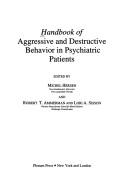| Listing 1 - 10 of 13 | << page >> |
Sort by
|
Book
ISBN: 0429898924 0429474156 1283951681 1782410678 9781782410676 9781780490595 9780429898921 9780429927386 042991315X Year: 2013 Publisher: London Karnac
Abstract | Keywords | Export | Availability | Bookmark
 Loading...
Loading...Choose an application
- Reference Manager
- EndNote
- RefWorks (Direct export to RefWorks)
"Why are humans, who are motivated by self-preservation, also motivated to engage in behaviors that threaten and even extinguish their existence? The present work has given thought to this question and examined the phenomenon of self-destruction through the perspectives of empirical psychology, psychoanalysis, analytical psychology, as well as existential-phenomenological psychology. The themes included in this book are: the emerging understanding of self-destructiveness in culture, religion, philosophy, and psychology; Bion's investigation into the self-destructive capacity of the mind; Heidegger's ontology of Being and the Enframing of technology; and identifying and delineating the 'who' who most experiences the impact of human-to-human destructiveness in our contemporary culture."--Provided by publisher.
Self-destructive behavior. --- Self-destructiveness --- Psychology, Pathological

ISBN: 0156565145 Year: 1966 Publisher: New York (N.Y.): Harcourt, Brace and World
Abstract | Keywords | Export | Availability | Bookmark
 Loading...
Loading...Choose an application
- Reference Manager
- EndNote
- RefWorks (Direct export to RefWorks)
Self-destructive behavior --- Self-destructiveness --- Psychology, Pathological --- Self-destructive behavior.
Book
ISBN: 0253036437 9780253036414 0253036410 9780253036438 9780253036391 0253036429 9780253036407 Year: 2018 Publisher: Bloomington
Abstract | Keywords | Export | Availability | Bookmark
 Loading...
Loading...Choose an application
- Reference Manager
- EndNote
- RefWorks (Direct export to RefWorks)
Self-destructive behavior. --- Self-control. --- Self-discipline --- Self-mastery --- Control (Psychology) --- Discipline --- Self-destructiveness --- Psychology, Pathological
Book
ISBN: 9780061430824 Year: 2009 Publisher: New York, NY HarperCollins Publishers, Inc.
Abstract | Keywords | Export | Availability | Bookmark
 Loading...
Loading...Choose an application
- Reference Manager
- EndNote
- RefWorks (Direct export to RefWorks)
religious self-destructiveness --- nuclear deterrence --- pleasure --- religious pleasure --- the School for Happiness --- sacrifice --- God's Love --- spiritual love --- martyrdom --- religion

ISBN: 0814774822 081477458X 0814769403 0585368287 9780814769409 Year: 1995 Publisher: New York (N.Y.): New York University press
Abstract | Keywords | Export | Availability | Bookmark
 Loading...
Loading...Choose an application
- Reference Manager
- EndNote
- RefWorks (Direct export to RefWorks)
Why, asks Daniel Rancour-Laferriere in this controversial book, has Russia been a country of suffering? Russian history, religion, folklore, and literature are rife with suffering. The plight of Anna Karenina, the submissiveness of serfs in the 16th and 17th centuries, ancient religious tracts emphasizing humility as the mother of virtues, the trauma of the Bolshevik revolution, the current economic upheavals wracking the country-- these are only a few of the symptoms of what The Slave Soul of Russia identifies as a veritable cult of suffering that has been centuries in the making. Bringing to light dozens of examples of self-defeating activities and behaviors that have become an integral component of the Russian psyche, Rancour-Laferriere convincingly illustrates how masochism has become a fact of everyday life in Russia. Until now, much attention has been paid to the psychology of Russia's leaders and their impact on the country's condition. Here, for the first time, is a compelling portrait of the Russian people's psychology.
National characteristics, Russian. --- Masochism --- Self-destructive behavior --- Russia (Federation) --- Civilization. --- Psychic masochism --- Russian national characteristics --- Self-destructiveness --- Paraphilias --- Personality disorders --- Sadomasochism --- Suffering --- Psychology, Pathological --- History of civilization --- Russia

ISBN: 0585053413 9780585053417 0791432939 0791432947 1438402864 9781438402864 Year: 1997 Publisher: Albany, NY State University of New York Press
Abstract | Keywords | Export | Availability | Bookmark
 Loading...
Loading...Choose an application
- Reference Manager
- EndNote
- RefWorks (Direct export to RefWorks)
Transpersonal psychology. --- Self-destructive behavior. --- Psychosynthesis. --- Personal psychosynthesis --- Spiritual psychosynthesis --- Psychotherapy --- Self-destructiveness --- Psychology, Pathological --- Psychology, Transpersonal --- Transhumanistic psychology --- Psychology --- Psychiatry
Book
ISBN: 9780231542500 023154250X 9780231177900 0231177909 Year: 2018 Publisher: New York, NY
Abstract | Keywords | Export | Availability | Bookmark
 Loading...
Loading...Choose an application
- Reference Manager
- EndNote
- RefWorks (Direct export to RefWorks)
"Picturing myself dying in a way I choose myself seems so comforting, healing and heroic. I'd look at my wrists, watch the blood seeping, and be a spectator in my last act of self-determination. By having lost all my self-respect it seems like the last pride I own, determining the time I die."-Kyra V., seventeenReading the confessions of a teenager contemplating suicide is uncomfortable, but we must do so to understand why self-harm has become epidemic, especially in the United States. What drives teenagers to self-harm? What makes death so attractive, so liberating, and so inevitable for so many? In Teenage Suicide Notes, sociologist Terry Williams pores over the writings of a diverse group of troubled youths to better grasp the motivations behind teenage suicide and to humanize those at risk of taking their own lives.Williams evaluates young people in rural and urban contexts and across lines of race, class, gender, and sexual orientation. His approach, which combines sensitive portrayals with sociological analysis, adds a clarifying dimension to the fickle and often frustrating behavior of adolescents. Williams reads between the lines of his subjects' seemingly straightforward reflections on alienation, agency, euphoria, and loss, and investigates how this cocktail of emotions can lead to suicide-or not. Rather than treating these notes as exceptional examples of self-expression, Williams situates them at the center of teenage life, linking them to abuse, violence, depression, anxiety, religion, peer pressure, sexual identity, and family dynamics. He captures the currents that turn self-destruction into an act of self-determination and proposes more effective solutions to resolving the suicide crisis.
Teenagers --- Adolescent psychology --- Self-mutilation --- Self-destructive behavior --- Self-destructiveness --- Psychology, Pathological --- Automutilation --- Self-harm (Self-mutilation) --- Self-injurious behavior (Self-mutilation) --- Self-injury (Self-mutilation) --- Malingering --- Mutilation --- Suicidal behavior

ISBN: 0306445492 1461360196 1461524032 Year: 1994 Publisher: New York (N.Y.): Plenum
Abstract | Keywords | Export | Availability | Bookmark
 Loading...
Loading...Choose an application
- Reference Manager
- EndNote
- RefWorks (Direct export to RefWorks)
Aggressiveness. --- Self-destructive behavior. --- Violence --- Aggression. --- Mental Disorders --- Klinische psychologie --- Psychological aspects. --- psychology. --- specifieke problemen --- Self-destructive behavior --- -Aggressiveness --- Aggression (Psychology) --- Aggressive behavior --- Aggressiveness (Psychology) --- Psychology --- Defensiveness (Psychology) --- Fighting (Psychology) --- Toughness (Personality trait) --- Violent behavior --- Social psychology --- Self-destructiveness --- Psychology, Pathological --- Psychological aspects --- specifieke problemen. --- Aggressiveness

ISBN: 0151253285 Year: 1973 Publisher: New York (N.Y.): Harcourt, Brace and Jovanovich
Abstract | Keywords | Export | Availability | Bookmark
 Loading...
Loading...Choose an application
- Reference Manager
- EndNote
- RefWorks (Direct export to RefWorks)
Americans --- Children of the rich --- Inheritance and succession --- Self-destructive behavior --- Young men --- Africa --- -Children of the rich --- Children of millionaires --- Rich children --- Wealthy children --- Yankees --- Self-destructiveness --- Bequests --- Descent and distribution --- Descents --- Hereditary succession --- Intestacy --- Intestate succession --- Law of succession --- Succession, Intestate --- Law and legislation --- Africa.
Book
ISBN: 9780813944357 9780813944395 9780813944340 081394435X Year: 2020 Publisher: Charlottesville, Va University of Virginia Press
Abstract | Keywords | Export | Availability | Bookmark
 Loading...
Loading...Choose an application
- Reference Manager
- EndNote
- RefWorks (Direct export to RefWorks)
"Updating Durkheim's classic work of the same title, Jason Manning shows that the causes of suicide worldwide are less psychiatric-depression-than social; that conflicts are more likely to become suicidal when they occur in a context of social closeness and social inferiority"-- The conventional approach to suicide is psychiatric: ask the average person why people kill themselves, and they will likely cite depression. But this approach fails to recognize suicide’s social causes. People kill themselves because of breakups and divorces, because of lost jobs and ruined finances, because of public humiliations and the threat of arrest. While some psychological approaches address external stressors, this comprehensive study is the first to systematically examine suicide as a social behavior with social catalysts.Drawing on Donald Black’s theories of conflict management and pure sociology, Suicide presents a new theory of the social conditions that compel an aggrieved person to turn to self-destruction. Interpersonal conflict plays a central but underappreciated role in the incidence of suicide. Examining a wide range of cross-cultural cases, Jason Manning argues that suicide arises from increased inequality and decreasing intimacy, and that conflicts are more likely to become suicidal when they occur in a context of social inferiority. As suicide rates continue to rise around the world, this timely new theory can help clinicians, scholars, and members of the general public to explain and predict patterns of self-destructive behavior.
Social psychology --- Social problems --- Sociological theories --- Suicide --- Suicidal behavior --- zelfdoding --- Self-destructive behavior --- Self-destructiveness --- Psychology, Pathological --- Attempted suicide --- Suicide, Attempted --- Suicide attempts --- Unsuccessful attempted suicide --- Unsuccessful suicide attempts --- Parasuicide --- Sociology of suicide --- Sociology --- Sociological aspects --- 179.7 --- Suicidal behavior. --- Self-destructive behavior. --- Sociological aspects.
| Listing 1 - 10 of 13 | << page >> |
Sort by
|

 Search
Search Feedback
Feedback About UniCat
About UniCat  Help
Help News
News